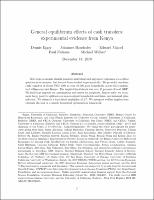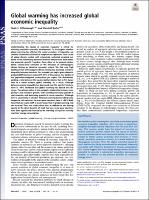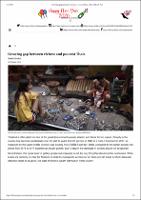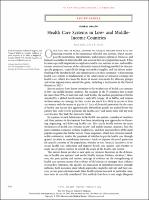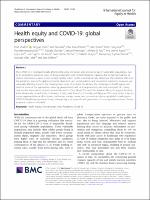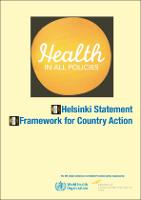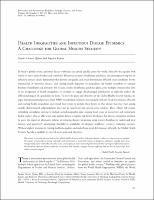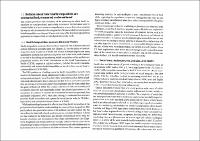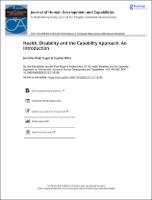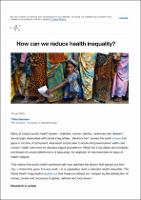Browsing by Title
Now showing items 121-140 of 299
-
General Equilibrium Effects of Cash Transfers: Experimental Evidence from Kenya
(National Bureau of Economic Research, 2019-12)
How large economic stimuli generate individual and aggregate responses is a central question in economics, but has not been studied experimentally. We provided one-time cash transfers of about USD 1000 to over 10,500 poor households across 653 randomized villages in rural Kenya. The implied fiscal shock was over 15 percent of local GDP. We find large impacts on consumption and assets for recipients. Importantly, we document large positive spillovers on non-recipient households and firms, and minimal price inflation. We estimate a local fiscal multiplier ... -
Global warming has increased global economic inequality
(2019-05-14)
Significance We find that global warming has very likely exacerbated global economic inequality, including ∼25% increase in population-weighted between-country inequality over the past half century. This increase results from the impact of warming on annual economic growth, which over the course of decades has accumulated robust and substantial declines in economic output in hotter, poorer countries—and increases in many cooler, wealthier countries—relative to a world without anthropogenic warming. Thus, the global warming caused by ... -
Global warming has increased global economic inequality
(The Journalist's Resource, Shorenstein center on media, politics and public policy, Harvard Kennedy School, 2019-05-14)
Significance We find that global warming has very likely exacerbated global economic inequality, including ∼25% increase in population-weighted between-country inequality over the past half century. This increase results from the impact of warming on annual economic growth, which over the course of decades has accumulated robust and substantial declines in economic output in hotter, poorer countries—and increases in many cooler, wealthier countries—relative to a world without anthropogenic warming. Thus, the global warming caused by ... -
Governance of Assisted Living in Singapore: Lessons for Aging Countries
(2022-06-14)
A global trend toward aging populations means that the challenge of providing adequate long-term care to older people looms large in many countries. In Singapore, a public discourse revolving around the expansion of assisted living to create age-friendly environments in long-term care has emerged. This study examines Singapore's experience in developing regulations for assisted living by documenting the different levels of regulation in place and by identifying the regulatory gaps remaining to govern assisted living. Anchoring in a conceptual ... -
Group inequality and intersectionality
(E-Bulletin of the Human Development & Capability Association, 2014-07) -
Growing gap between richest and poorest Thais
(the ASEAN Post, 2019-10-25) -
Health care systems in low- and middle-income countries
(Massachusetts Medical Society, 2014-02-06)
This review draws on what is now quite an extensive literature on the deficiencies of health care systems and on the Health Systems Evidence database. However, the poor quality and uneven coverage of evidence on the strengthening of health care systems means that evidence of deficiencies is stronger than evidence of remedies. Moreover, the specific circumstances of individual countries strongly influence both decisions about which approaches might be relevant and their success, so any generalizations made from health systems research in particular ... -
Health equity and COVID-19: global perspectives
(2020-12)
The COVID-19 is disproportionally affecting the poor, minorities and a broad range of vulnerable populations, due to its inequitable spread in areas of dense population and limited mitigation capacity due to high prevalence of chronic conditions or poor access to high quality public health and medical care. Moreover, the collateral effects of the pandemic due to the global economic downturn, and social isolation and movement restriction measures, are unequally affecting those in the lowest power strata of societies. To address the challenges to ... -
Health financing policies during the COVID-19 pandemic and implications for universal health care: a case study of 15 countries
(2023-12)
Background: The COVID-19 pandemic was a health emergency requiring rapid fiscal resource mobilisation to support national responses. The use of effective health financing mechanisms and policies, or lack thereof, affected the impact of the pandemic on the population, particularly vulnerable groups and individuals. We provide an overview and illustrative examples of health financing policies adopted in 15 countries during the pandemic, develop a framework for resilient health financing, and use this pandemic to argue a case to move towards ... -
Health in all policies: Helsinki statement. Framework for country action
(World Health Organization, 2021)
The participants to the 8th Global Conference on Health Promotion endorsed the Helsinki Statement on Health in All Policies In which they prioritize health and equity as a core responsibility of governments to its peoples, affirm the compelling and urgent need for effective policy coherence for health and well-being and recognize that this will require political will, courage and strategic foresight. The participants of the Conference call on governments to fulfill their obligations to their people’s health and wellbeing by taking a number of ... -
Health Inequalities and Infectious Disease Epidemics: A Challenge for Global Health Security
(2014)
In today's global society, infectious disease outbreaks can spread quickly across the world, fueled by the rapidity with which we travel across borders and continents. Historical accounts of influenza pandemics and contemporary reports on infectious diseases clearly demonstrate that poverty, inequality, and social determinants of health create conditions for the transmission of infectious diseases, and existing health disparities or inequalities can further contribute to unequal burdens of morbidity and mortality. Yet, to date, studies of influenza ... -
Health inequalities: critical perspectives
(Oxford University Press, 2016)
This section provides a brief summary of the main ways in which health in-equalities are conceptualized, particularly in terms of the indicators used to stratify health. It is by no means a comprehensive account but rather considers the ways in which researchers focusing on the UK have tended to conceptualize health inequalities over the past 30 years and some of the key chalenges to these approaches (critiques which are developed later in this book). -
The health needs and access barriers among refugees and asylum-seekers in Malaysia: A qualitative study
(2018-08-15)
Background: In Malaysia, refugees and asylum-seekers are a vulnerable group that often face circumstances in which their health and wellbeing can be compromised. This qualitative study sought to examine the key health concerns and barriers to healthcare access among refugees and asylum-seekers in Malaysia through the lens of healthcare professionals, program staff and experts on refugee and migrant health. Methods: We conducted 20 semi-structured in-depth interviews with experts, healthcare professionals, program managers or executives from ... -
Health System Responses to the Health Needs of Refugees and Asylum-seekers in Malaysia: A Qualitative Study
(2019-05-06)
Background: This study was conducted to examine the responses and challenges in addressing the health needs of refugees and asylum-seekers in Malaysia from a health systems and policy perspective. Methods: Twenty semi-structured in-depth interviews were conducted with key informants comprising experts, healthcare professionals and program personnel with professional experience in refugee health issues. Deductive and inductive analyses were conducted to identify themes. Results: Our study identified a broad range of actors involved in the response ... -
Health Workers on the Political Frontlines
(2022-06) -
Health, Disability and the Capability Approach: An Introduction
(Journal of Human Development and Capabilities, 2015)
This special issue of the Journal of Human Development and Capabilities focuses on two areas of substantial and growing importance to the human development and capability approach: disability and health. The research on disability, health and the capability approach has been diverse in the topics it covers, and the conceptual frameworks and methodologies it uses, beginning over a decade and a half ago in health (Ruger 1998) and more than a decade ago in disability (Baylies 2002).1 We are pleased to share a set of articles in these two areas. ... -
Healthcare for migrant workers in destination countries: a comparative qualitative study of China and Malaysia
(2020-11-09)
Objectives: This paper explores policies addressing migrant worker’s health and barriers to healthcare access in two middle-income, destination countries in Asia with cross-border migration to Yunnan province, China and international migration to Malaysia. Design: Qualitative interviews were conducted in Rui Li City and Tenchong County in Yunnan Province, China (n=23) and Kuala Lumpur, Malaysia (n=44), along with review of policy documents. Data were thematically analysed. Participants: Participants were migrant workers and key stakeholders ... -
HIV and syphilis knowledge, perceptions, and practices among Myanmar migrant workers in Samut Sakhon Province, Thailand
(2022-11-28)
Background: Thailand has been one of the largest migration hubs in Southeast Asia for the past four decades and keeps attracting migrants from neighboring countries. Due to difficulties associated with their status, migration can place individuals at a heightened risk for sexually transmitted diseases. This study aimed to examine factors influencing HIV and syphilis preventive behaviors among Myanmar migrants in Samut Sakhon, Thailand. Methods: A cross-sectional mixed-method study was conducted among Myanmar migrants aged 18 years and above ... -
HIV/AIDS health care challenges for cross-country migrants in low- and middle-income countries: a scoping review
(2024-02-26)
Introduction: HIV/AIDS has been one of the world’s most important health challenges in recent history. The global solidarity in responding to HIV/AIDS through the provision of antiretroviral therapy (ART) and encouraging early screening has been proved successful in saving lives of infected populations in past decades. However, there remain several challenges, one of which is how HIV/AIDS policies keep pace with the growing speed and diversity of migration flows. This study therefore aimed to examine the nature and the extent of HIV/AIDS health ... -
How can we reduce health inequality?
(2015-01-19)

